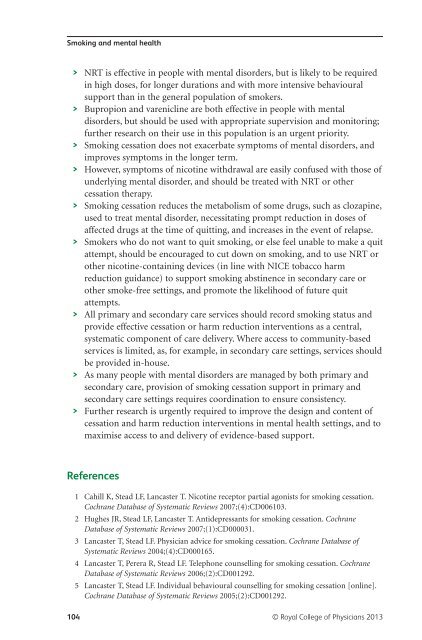Smoking and mental health - NCSCT
Smoking and mental health - NCSCT
Smoking and mental health - NCSCT
You also want an ePaper? Increase the reach of your titles
YUMPU automatically turns print PDFs into web optimized ePapers that Google loves.
<strong>Smoking</strong> <strong>and</strong> <strong>mental</strong> <strong>health</strong><br />
> NRT is effective in people with <strong>mental</strong> disorders, but is likely to be required<br />
in high doses, for longer durations <strong>and</strong> with more intensive behavioural<br />
support than in the general population of smokers.<br />
> Bupropion <strong>and</strong> varenicline are both effective in people with <strong>mental</strong><br />
disorders, but should be used with appropriate supervision <strong>and</strong> monitoring;<br />
further research on their use in this population is an urgent priority.<br />
> <strong>Smoking</strong> cessation does not exacerbate symptoms of <strong>mental</strong> disorders, <strong>and</strong><br />
improves symptoms in the longer term.<br />
> However, symptoms of nicotine withdrawal are easily confused with those of<br />
underlying <strong>mental</strong> disorder, <strong>and</strong> should be treated with NRT or other<br />
cessation therapy.<br />
> <strong>Smoking</strong> cessation reduces the metabolism of some drugs, such as clozapine,<br />
used to treat <strong>mental</strong> disorder, necessitating prompt reduction in doses of<br />
affected drugs at the time of quitting, <strong>and</strong> increases in the event of relapse.<br />
> Smokers who do not want to quit smoking, or else feel unable to make a quit<br />
attempt, should be encouraged to cut down on smoking, <strong>and</strong> to use NRT or<br />
other nicotine-containing devices (in line with NICE tobacco harm<br />
reduction guidance) to support smoking abstinence in secondary care or<br />
other smoke-free settings, <strong>and</strong> promote the likelihood of future quit<br />
attempts.<br />
> All primary <strong>and</strong> secondary care services should record smoking status <strong>and</strong><br />
provide effective cessation or harm reduction interventions as a central,<br />
systematic component of care delivery. Where access to community-based<br />
services is limited, as, for example, in secondary care settings, services should<br />
be provided in-house.<br />
> As many people with <strong>mental</strong> disorders are managed by both primary <strong>and</strong><br />
secondary care, provision of smoking cessation support in primary <strong>and</strong><br />
secondary care settings requires coordination to ensure consistency.<br />
> Further research is urgently required to improve the design <strong>and</strong> content of<br />
cessation <strong>and</strong> harm reduction interventions in <strong>mental</strong> <strong>health</strong> settings, <strong>and</strong> to<br />
maximise access to <strong>and</strong> delivery of evidence-based support.<br />
References<br />
1 Cahill K, Stead LF, Lancaster T. Nicotine receptor partial agonists for smoking cessation.<br />
Cochrane Database of Systematic Reviews 2007;(4):CD006103.<br />
2 Hughes JR, Stead LF, Lancaster T. Antidepressants for smoking cessation. Cochrane<br />
Database of Systematic Reviews 2007;(1):CD000031.<br />
3 Lancaster T, Stead LF. Physician advice for smoking cessation. Cochrane Database of<br />
Systematic Reviews 2004;(4):CD000165.<br />
4 Lancaster T, Perera R, Stead LF. Telephone counselling for smoking cessation. Cochrane<br />
Database of Systematic Reviews 2006;(2):CD001292.<br />
5 Lancaster T, Stead LF. Individual behavioural counselling for smoking cessation [online].<br />
Cochrane Database of Systematic Reviews 2005;(2):CD001292.<br />
104 © Royal College of Physicians 2013














